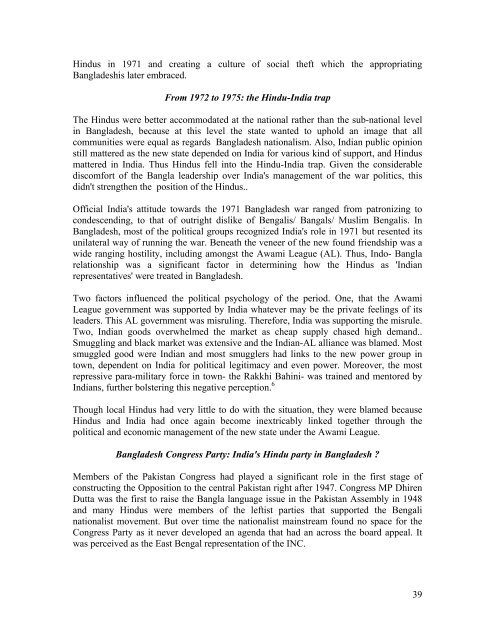Living on the Margins. Minorities in South Asia - EURAC
Living on the Margins. Minorities in South Asia - EURAC
Living on the Margins. Minorities in South Asia - EURAC
- TAGS
- minorities
- eurac
- www.eurac.edu
Create successful ePaper yourself
Turn your PDF publications into a flip-book with our unique Google optimized e-Paper software.
H<strong>in</strong>dus <strong>in</strong> 1971 and creat<strong>in</strong>g a culture of social <strong>the</strong>ft which <strong>the</strong> appropriat<strong>in</strong>g<br />
Bangladeshis later embraced.<br />
From 1972 to 1975: <strong>the</strong> H<strong>in</strong>du-India trap<br />
The H<strong>in</strong>dus were better accommodated at <strong>the</strong> nati<strong>on</strong>al ra<strong>the</strong>r than <strong>the</strong> sub-nati<strong>on</strong>al level<br />
<strong>in</strong> Bangladesh, because at this level <strong>the</strong> state wanted to uphold an image that all<br />
communities were equal as regards Bangladesh nati<strong>on</strong>alism. Also, Indian public op<strong>in</strong>i<strong>on</strong><br />
still mattered as <strong>the</strong> new state depended <strong>on</strong> India for various k<strong>in</strong>d of support, and H<strong>in</strong>dus<br />
mattered <strong>in</strong> India. Thus H<strong>in</strong>dus fell <strong>in</strong>to <strong>the</strong> H<strong>in</strong>du-India trap. Given <strong>the</strong> c<strong>on</strong>siderable<br />
discomfort of <strong>the</strong> Bangla leadership over India's management of <strong>the</strong> war politics, this<br />
didn't streng<strong>the</strong>n <strong>the</strong> positi<strong>on</strong> of <strong>the</strong> H<strong>in</strong>dus..<br />
Official India's attitude towards <strong>the</strong> 1971 Bangladesh war ranged from patr<strong>on</strong>iz<strong>in</strong>g to<br />
c<strong>on</strong>descend<strong>in</strong>g, to that of outright dislike of Bengalis/ Bangals/ Muslim Bengalis. In<br />
Bangladesh, most of <strong>the</strong> political groups recognized India's role <strong>in</strong> 1971 but resented its<br />
unilateral way of runn<strong>in</strong>g <strong>the</strong> war. Beneath <strong>the</strong> veneer of <strong>the</strong> new found friendship was a<br />
wide rang<strong>in</strong>g hostility, <strong>in</strong>clud<strong>in</strong>g am<strong>on</strong>gst <strong>the</strong> Awami League (AL). Thus, Indo- Bangla<br />
relati<strong>on</strong>ship was a significant factor <strong>in</strong> determ<strong>in</strong><strong>in</strong>g how <strong>the</strong> H<strong>in</strong>dus as 'Indian<br />
representatives' were treated <strong>in</strong> Bangladesh.<br />
Two factors <strong>in</strong>fluenced <strong>the</strong> political psychology of <strong>the</strong> period. One, that <strong>the</strong> Awami<br />
League government was supported by India whatever may be <strong>the</strong> private feel<strong>in</strong>gs of its<br />
leaders. This AL government was misrul<strong>in</strong>g. Therefore, India was support<strong>in</strong>g <strong>the</strong> misrule.<br />
Two, Indian goods overwhelmed <strong>the</strong> market as cheap supply chased high demand..<br />
Smuggl<strong>in</strong>g and black market was extensive and <strong>the</strong> Indian-AL alliance was blamed. Most<br />
smuggled good were Indian and most smugglers had l<strong>in</strong>ks to <strong>the</strong> new power group <strong>in</strong><br />
town, dependent <strong>on</strong> India for political legitimacy and even power. Moreover, <strong>the</strong> most<br />
repressive para-military force <strong>in</strong> town- <strong>the</strong> Rakkhi Bah<strong>in</strong>i- was tra<strong>in</strong>ed and mentored by<br />
Indians, fur<strong>the</strong>r bolster<strong>in</strong>g this negative percepti<strong>on</strong>. 6<br />
Though local H<strong>in</strong>dus had very little to do with <strong>the</strong> situati<strong>on</strong>, <strong>the</strong>y were blamed because<br />
H<strong>in</strong>dus and India had <strong>on</strong>ce aga<strong>in</strong> become <strong>in</strong>extricably l<strong>in</strong>ked toge<strong>the</strong>r through <strong>the</strong><br />
political and ec<strong>on</strong>omic management of <strong>the</strong> new state under <strong>the</strong> Awami League.<br />
Bangladesh C<strong>on</strong>gress Party: India's H<strong>in</strong>du party <strong>in</strong> Bangladesh ?<br />
Members of <strong>the</strong> Pakistan C<strong>on</strong>gress had played a significant role <strong>in</strong> <strong>the</strong> first stage of<br />
c<strong>on</strong>struct<strong>in</strong>g <strong>the</strong> Oppositi<strong>on</strong> to <strong>the</strong> central Pakistan right after 1947. C<strong>on</strong>gress MP Dhiren<br />
Dutta was <strong>the</strong> first to raise <strong>the</strong> Bangla language issue <strong>in</strong> <strong>the</strong> Pakistan Assembly <strong>in</strong> 1948<br />
and many H<strong>in</strong>dus were members of <strong>the</strong> leftist parties that supported <strong>the</strong> Bengali<br />
nati<strong>on</strong>alist movement. But over time <strong>the</strong> nati<strong>on</strong>alist ma<strong>in</strong>stream found no space for <strong>the</strong><br />
C<strong>on</strong>gress Party as it never developed an agenda that had an across <strong>the</strong> board appeal. It<br />
was perceived as <strong>the</strong> East Bengal representati<strong>on</strong> of <strong>the</strong> INC.<br />
39

















